- Home
- Marie Rutkoski
The Hollow Heart Page 2
The Hollow Heart Read online
Page 2
She promised a ride on her stallion as a reward. Javelin was strong, enormous. He was in his prime then. I always begged to ride him. She would say no, not because she worried that he’d throw me, but that I’d lose my seat and fall.
This time, I didn’t even have to ask. Javelin was a gift freely given. Up you go. She boosted me into his saddle. I was a sudden giant. I looked down at the crown of her head, her braided hair the color of lamplight. She fussed with a stirrup. She was going to walk beside me, I could tell, and I became instantly frustrated. I had done what she had asked. I had worked hard for my answer to her question. And now, to be babied? Rebellion lit my blood. My heels kicked into Javelin’s sides. We flew. I did not fall.
I think I was five years old.
Many years later, when I yelled at her, when I said I would never do what she wanted, that she could go to hell, when I shouted with all the fury she might have shown me that time I took off recklessly on her horse, she said, You are an apple, Sidarine.
What? I wanted to tear my hair out. I had no idea what she was talking about. I didn’t, then, remember that day by the pier, her test. I said, For once, say what you mean! I am sick of your riddles. I am sick of you. How dare you expect me to marry. I do not want him. I do not want any man. Do you hear me? I never will.
I think, she said coldly, you know exactly what I mean.
I remembered, then, the apple and the stone, and saw instantly her insult. This was how she saw me: filled with sweet air. I had given myself over to pleasure. All the girls I had taken to bed. She knew about them. Of course she did. She was the queen of spies. Clearly, she thought I liked a fresh dessert so much that I had become one. What did I know, her expression said, of duty?
Well, she was right. I knew nothing of duty. I refused to know it. I slammed the door to her suite behind me. I gathered my things and stole a few others. I cast off from the city that very night.
Roshar has left me alone at the ship’s rail. I wipe my wet face. My old hurt pushes against my new one. Was this why Nirrim said no? I love you, I said, but she didn’t feel the same way. Maybe she saw in me what my mother saw: someone unworthy.
My mother might die.
I say this to myself, over and over. Though I only half believe in gods, I pray for wind.
She cannot die. Impossible. She is strong. Hard. A weapon if need be. You’d have to break her open to see what’s inside. My mother: dropped down deep, secret and invisible below the waves.
My mother is stone.
NIRRIM
THE TAVERN IS DARK AND cool when I open the door, the iron handle hot from the lowering sun. I have no time for this. No time to see, with new eyes, the place I used to call home. No time to hunt my victim. A war is brewing, one of my own making, and my enemies will know the cost of what they did to me and every one of my kind. But one enemy must come first. My blood demands it.
I was so innocent, so easily ruled.
Where is she?
Slipping into the tavern’s interior is like sliding into a fresh pool. I close the door against the dusty heat of the street.
“Raven,” I call, making my voice sweet, timid. The name echoes over the empty tables. It sits in empty chairs. “Ama,” I try again, using the word small children call their mothers, “are you here? I am sorry we argued. I am here to make things right.”
I lift the Elysium bird from my shoulder and set it on a rough-hewn table. The bird trills at me, tipping its crimson head left and right—trying, I think, to win me over, or ask for something. It scratches the table with a green talon. I remember everything from my past perfectly, from the grain of the orphanage floorboards that I mopped by hand when I was four years old to the number of petals on the first flower I saw. But sometimes I don’t pay attention to memories I hold inside me, and it takes a moment as I stare, irritated at the bird for distracting me from my purpose, to connect its behavior to the act of begging. It nudges its head under my hand.
Feed it, says a quiet voice inside me.
I frown, unsettled. The instruction came not as a thought formed by me, but as an intrusion, as though someone had whispered in my ear. Surely I have imagined it. I fetch a hunk of stale bread from the larder in the corner. Of course I will feed the bird. It is useful to me. Anyway, it is loud and unpredictable. Let it be occupied by satisfying its hunger while I pursue my prey. I tear the bread into pieces and drop them onto the table in front of the Elysium bird, whose inky beak jabs into the dry morsels, wings fluttering excitedly.
The slight grit of my dirty sandals scuffs the stone floor as I leave the bird behind. My feet drift down the stairs to the kitchen, where I once worked hard to please my mistress. At the orphanage, when she personally selected me, Raven touched my cheek and said, I know a good girl when I see one.
The kitchen is empty. Her bedroom? The steps leading upstairs creak beneath my feet. Did Raven see me in the agora? Does she fear me now, and hide? Then I must tempt her forth. “I have a gift for you, Ama. You will love it!”
No answer. Her room, into which I was admitted only to brush her hair or rub her soft hands with cream before bed (I work so hard for my girls, she used to sigh, and I would believe her), has the familiar smell I associate with her: indi soap made from the perfume of tenacious purple flowers that grow wild in the Ward. The clothes in her wardrobe are nicer than anything I wore during my childhood, when I never thought it wrong that her dresses were made of cotton, not wincey, like mine. I never thought it wrong that her sandals were more comfortable and didn’t leave blisters. She was Middling, after all, so the law allowed her things it didn’t allow me. Even if the law didn’t, I would have wanted her to have the comforts that I did not. Wasn’t that what a daughter should want? Maybe I wasn’t Raven’s daughter, not really, but I loved her like one.
I go through her things, snorting when I see a tear in a dress, neatly mended by Annin. How Raven must have laughed inside as she played her charade of selflessness! Oh, I scrimp and save, she said to me once, so that I can put more money aside for you girls. And of course—she leaned in to whisper—for our cause.
Meanwhile, she extracted every coin she could from Half Kith desperate to flee the Ward, even this city. She gave them passports that faked their kith—passports forged by me, the idiot, who believed we helped people for nothing.
I am grateful to the god of thieves. Joy thrills down to my toes, to know that I am no longer who I was. What use was my soft heart? It convinced me to excuse the bad behavior of others, to let myself be used, to forgive Raven when she hurt me. The loss of my heart is no bad thing. It left room for something else.
Freedom.
Anger.
My heart was full of guilt and love and tender forgiveness. Let the god of thieves keep it forever. Now nothing will stop me from doing what I want—for myself and everyone loyal to me.
I riffle through the drawer of Raven’s wobbly bedside table. Next: the desk where she once sat me down and exclaimed over how perfectly I could imitate a signature. My little artist! she said, and I glowed from her praise, not understanding then that there was little art to what I did, only the power of a perfect memory.
She is not here. She left nothing of value behind. She must have squirreled it all away in that house she built for herself in the Middling quarter, lining it with the nicest things the law allowed her. She must be there. Well, I will find her, and we will see who is the fool now. I fling open a roughly carved wooden jewelry box and snarl at the trinkets inside. Tin earrings. A tarnished silver chain I gave her when I was fourteen, having bartered work in a neighbor’s scraggly little garden. How beautiful! she said, adding, I will put it with my treasures.
When I noticed she never wore it, she said, It is too good to wear, my lamb. People will get jealous.
I see it now for what it is: trash. I toss it to the floor.
Where is the crescent moon necklace that once belonged to my mother, which Raven stole? Still around Raven’s weathered neck, most likely. My
hands twitch as though I could wring that neck like a rag. Yet I pause, surprised by the force of my longing for a sentimental object, my irrational hope. What did the god of thieves steal from me, if I can still hope, still seek comfort in a symbol that doesn’t even prove its original owner loved me?
A hand lightly slips into mine. Instinctively, I crush it between my fingers. Someone cries out. I turn and see Annin, her blue eyes wide as she begs me to let her go. “You’re hurting me!”
“Nirrim,” comes a new voice, low and calm. Morah stands at the threshold of Raven’s bedroom. “You are not yourself.”
Aren’t I? Aren’t I the most perfect version of myself, who can look at these two young women and care nothing for the opinion of Morah, who used to lord her supposed wisdom over me, and care nothing for Annin, sweet little Annin, so easily biddable? She is a pretty doll with a porcelain head filled with pins. She would rattle if you shook her. She reminds me of me: who I once was. I double my grip. She screams, face contorting. Good. She no longer looks so pretty.
Morah slowly crosses the room toward me. “You will break her fingers. She won’t be able to sew. She loves to sew.”
Morah expects these words to move me and make me loosen my grip, but Annin needs to learn not to be so trusting. She scrabbles at me, like a kitten might twist against a grip at the nape of its neck, and I am momentarily amused. Neither she nor Morah seem to consider I possess a power more formidable than a mere grip. I am so distracted by their ignorance that I don’t notice—until Morah sets the sharp blade against my throat—the kitchen knife she must have held at her thigh, hidden in the folds of her skirt, as she crossed the room to me.
“Let her go,” Morah says.
The threat is ridiculous. Morah does not understand my god-gift. I could force a false memory into her mind. You dropped the knife, I could say, and re-create the past so that it becomes her present and she sends the knife clattering to the floor. I could make her freshly feel her most painful memory. Years ago—how many? Ten?—Raven stole Morah’s baby. Morah never knew what happened to the newborn boy. Yes, that might be a good thing to make her remember.
Don’t, says that quiet, internal voice, the same one that told me to feed the Elysium.
Startled, I loosen my grip. It’s enough for Annin to tug her sweaty fingers free.
My scalp crawls. Earlier, my impulse to feed the Elysium was easily dismissed as a stray thought … and a practical one that suited my goals. Now, however, I pay attention to that eerily familiar voice that seems at once inside me and outside me. The voice is low and steady. Like a candle flame, Sid once told me.
That voice is mine.
Morah presses the knife harder to my throat, so close it bites the skin.
A knot hardens in my belly. Once, I loved Morah and Annin like sisters. They should be my allies and strive to achieve my goals. I dislike having my will checked by some whispery ghost in my head: a shadow of the girl I used to be.
Annin wipes tears from her cheeks, her skin lighter than mine—always ready to blush or pale, quick to show her emotions. Her face might as well be a painted sign announcing her thoughts to the world. She reddens in distress.
Very well, I tell that needling little voice, which I sense waiting for some response. I won’t hurt them. That would look bad to the Half Kith, whose loyalty I need to consolidate. I bat the knife from Morah’s hand. It clatters to the floor. She never would have used it anyway. She is too fond of me.
The old me.
Morah’s expression betrays no fear, even though her weapon lies out of easy reach. Once she was the toughest of us three, as resilient as the sturdy kitchen worktable downstairs. “Nirrim, you can’t simply walk into the agora and proclaim yourself queen of Herrath.”
“I already did. Have you come to try to reason with me? Fair fortune to fools.”
“I am not here for anything. This is my home. Annin’s, too. And yours.”
I glance around Raven’s shabby room, remembering how mysteriously grand it seemed when I was little and knew no better. “I don’t want this home. You may keep it. My people will know me as a generous queen.”
Annin, cradling her hand, casts Morah a skittish look. Annin says, “You claimed you are a god. But there are no gods.”
I wave away her stupid words. “You think I’m mad, I suppose. Well, you shall see.” They clearly have not a drop of god-blood in them, nor much ambition. Having decided not to punish them, and certain they can do little to advance my cause, I return to my task, tearing apart Raven’s room to find whatever secrets she might have hidden. You will never know anything more about your mother, she warned me. How you were born. Who you are! I ran from her, horrified at how she had used me—and wanted to continue using me. You will be nothing to me, she promised—she, who revealed herself as my mother’s sister, and might know from which god I came. The kind of power I possess is no certain clue. The god of thieves’s history book revealed that the gifts of the half-gods were not mere copies of those of their immortal parents. When the gods abandoned Ethin long ago, retreating to their realm, the powers they left in their half-god children diminished and changed through generations. Probably Aden is a descendent of the sun god. Everything about Aden has always been so obvious. His boring, handsome face. The foregone conclusion the entire Ward shared that of course I should love him. His jealousy. His insecurity. No doubt his glowing god-gift could be traced to the most obvious source.
The same is not true of my gift. There is no god of memory.
Perhaps my long-ago ancestor was the god of some aspect of the mind, such as dreams.
Or the god of stars, the one that rules fate.
Or vengeance. What is memory, if not an account of all the wrongs done?
Maybe I can trace my kin back to the god of wealth, who demands a balancing of the scales, for surely I was born to demand payment for each wound inflicted on me and my own.
I retrieve Morah’s knife from the floor and cut into the mattress, pulling out handfuls of straw-and-rag padding. I probably do look mad. There must still be streaks of color in my hair, put there by Madame Mere, a High-Kith dressmaker, who also painted cosmetics on my face—smeared now, I’m sure. I attack the bedding, cutting more deeply, looking for that necklace, or for anything that might give me a clue to my parentage. Nothing is hidden there, but I keep stabbing. It feels good.
Morah says, “We think something happened to you, damaged you. You are no longer the person you were.”
“Because I am angry? Because I am strong? Why aren’t you angry? You have been treated just as badly.”
Annin says, “We are worried about you.”
“Don’t be. I feel wonderful,” I say, and it is true.
I abandon the gutted mattress and lift Raven’s handheld mirror from her dressing table, though not to look into its glass. When I shake the mirror, the glass rattles in its frame. Believing there might be something hidden between the mirror and its frame, I crack it against the vanity. Silver shards clink to my feet. There is nothing but a lead handle and a simple wooden backing to the frame.
“Nirrim—”
“You bore me. You are stupid chickens, clucking away. I am tired of people who know nothing, who lie to themselves that one day things will be better if they only have patience. A tale for children and idiots. Brave people take matters into their own hands. Learn this now, or learn later and be left behind.” I snap my fingers rapidly, as though to wake them up or hurry them along. “Will you help me or not?”
Annin says, “Help you destroy Raven’s room?”
“Help me with the war.”
“War?”
“Yes, war. Do you believe the High Kith will simply give us what we want? We must take it.” They look at me as though I am a bee that has unwittingly flown into someone’s home, and thuds itself against a window to get out. Their expressions show me more than the mirror I broke: how erratic I appear. Erratic is how I feel: seeking one thing and then the next, desiring som
ething and then changing my mind. It is true that a void lurks beneath the giddiness of my new freedom and power, as though the god of thieves stole not my heart but the center of my being. That void is a hollow chamber that echoes with only one command: those who made me suffer will pay.
Uncertainty marks Morah’s and Annin’s faces.
They never hurt you, says the voice inside me. They loved you.
They are useless, I tell Other Nirrim. Just like you were useless.
I reach for a metal hairbrush. In the past, I would gently draw it through Raven’s silver hair and untangle each knot with careful fingers. Like the mirror, the brush has a backing—hard and painful, as I know well, from every time Raven struck me with it. I pry at the backing and feel again like that bee I imagined, banging softly at windows. A buzzing rises within me, blocking my ears against Morah’s and Annin’s questions, their silly concerned tones. The backing comes off in my hands. Two whitely bright lights tumble out of the revealed space and onto the dressing table.
Earrings. Jewels unlike anything I have ever seen. Each earring is a tiny star, its light pure. Annin gasps. I don’t recognize the earrings, but instantly know they form a set with the crescent moon necklace my mother once wore. Like the necklace, they are otherworldly.
They are mine now.
I have no piercings for earrings, since Half Kith were never allowed even the most modest jewelry. No matter. I push my hair aside, set the sharp tip of an earring against my earlobe, and press until the stud pops through the flesh. Blood dribbles down my neck. Happily, I fasten the earring and do the same with the other. A broken shard of mirror lying on the dresser catches my reflection. Yes, I do look crazed: cosmetics streaked across my face, my mouth open in delight, lines of blood down my throat, twin stars glowing at my ears.
I didn’t find what I was looking for, neither my revenge upon Raven nor her secrets about my parents nor the necklace, but perhaps these jewels are an even better discovery. I grew up so starved of beauty, so used to the starvation that I couldn’t even recognize, then, what I was missing.

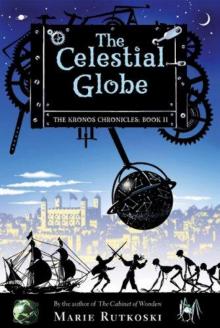 The Celestial Globe
The Celestial Globe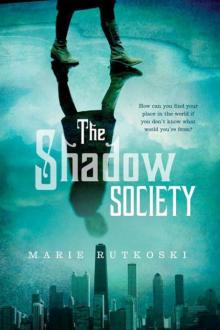 The Shadow Society
The Shadow Society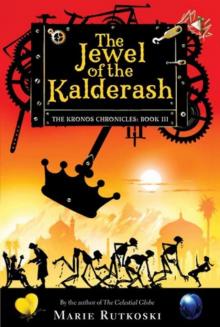 The Jewel of the Kalderash
The Jewel of the Kalderash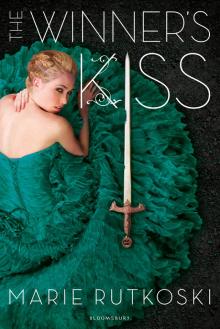 The Winner's Kiss
The Winner's Kiss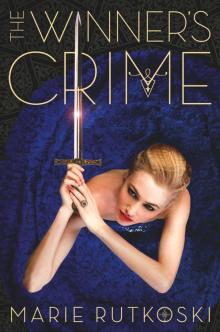 The Winner's Crime
The Winner's Crime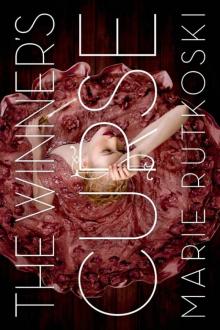 The Winner's Curse
The Winner's Curse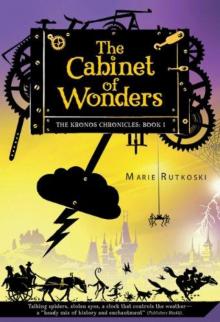 The Cabinet of Wonders
The Cabinet of Wonders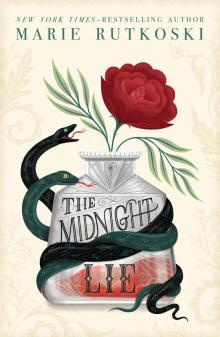 The Midnight Lie
The Midnight Lie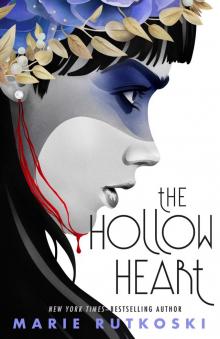 The Hollow Heart
The Hollow Heart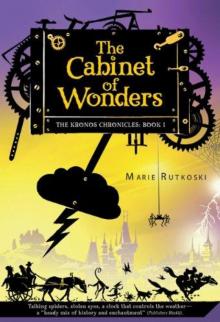 The Cabinet of Wonders: The Kronos Chronicles: Book I
The Cabinet of Wonders: The Kronos Chronicles: Book I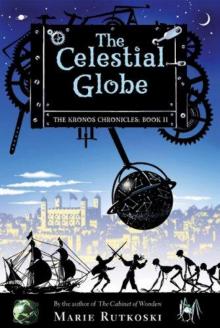 The Celestial Globe: The Kronos Chronicles: Book II
The Celestial Globe: The Kronos Chronicles: Book II